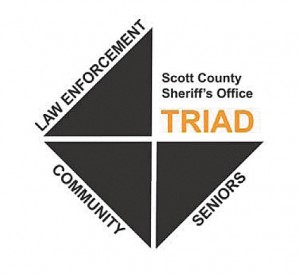May 28, 2015
TRIAD– Helping Prevent Crimes Against Seniors
 TRIAD, a cooperative effort of Quad City law enforcement agencies, senior citizens, and senior organizations, is focused on reducing crimes against our most vulnerable citizens: you – our seniors. Triad is a nationally recognized organization that is lead locally by the Scott County Sheriff’s Department, City of Davenport and Bettendorf Police Departments and the Center For Active Seniors, Inc. (CASI). The goal of TRIAD is to improve and enrich the quality of life for older adults by focusing and assessing the needs of the Quad City community. Members of the TRIAD team are available to do community presentations and increase awareness to the latest scams taking place. The council meets the fourth Wednesday of each month, from 9:30-11 a.m. at the Center For Active Seniors, Inc. (CASI), 1035 West Kimberly Road, Davenport. If you would like to participate in this meeting or learn more about TRIAD/SALT, call CASI at (563) 386-7477.
TRIAD, a cooperative effort of Quad City law enforcement agencies, senior citizens, and senior organizations, is focused on reducing crimes against our most vulnerable citizens: you – our seniors. Triad is a nationally recognized organization that is lead locally by the Scott County Sheriff’s Department, City of Davenport and Bettendorf Police Departments and the Center For Active Seniors, Inc. (CASI). The goal of TRIAD is to improve and enrich the quality of life for older adults by focusing and assessing the needs of the Quad City community. Members of the TRIAD team are available to do community presentations and increase awareness to the latest scams taking place. The council meets the fourth Wednesday of each month, from 9:30-11 a.m. at the Center For Active Seniors, Inc. (CASI), 1035 West Kimberly Road, Davenport. If you would like to participate in this meeting or learn more about TRIAD/SALT, call CASI at (563) 386-7477.
Iowa Attorney General Tom Miller has sent out a letter about one of the latest scams in our area: Debt Collection Scams. Some of the high points include:
Who or What Are Debt Collectors? A debt collector is someone who regularly collects or attempts to collect consumer debts owed to others. If you’re in debt, federal and state laws provide you with some protections in how creditors or debt collection companies can collect on what you owe. Know your rights.
Laws Limit Initial Contacts by Debt Collectors – A debt collector may contact you or your family in person, by mail, email, telephone, fax or telegram. However, a debt collector may not contact you at unreasonable times or places, such as before 8 a.m. or after 9 p.m. (unless you agree to it), and cannot contact you with such frequency that it could reasonably be considered harassing.
Debt Collection Scams – Some criminals will pose as debt collectors. They’ll claim that you owe money tied to a loan or debt and that you must pay immediately. These types of criminals are aggressive, convincing and threatening. It’s possible they accessed some information about you or a debt you may really owe, or may make up the scenario entirely.
These cases almost always involve claims that you must pay now or face serious consequences. They may convince you that you are about to face a lawsuit, or may even face arrest if you don’t pay immediately. They will most often insist on payment by credit card, debit card, pre-paid money cards or a money wire transfer.
If You Suspect a Scam – Simply don’t talk to the caller and hang up. If you’re not sure whether it’s legitimate, ask the caller for his or her name, address and phone number, who he or she represents, the creditor and details about the debt. If the caller refuses to provide it or claims he or she can’t provide it, then the debt collector isn’t legitimate. You should insist that the person calling provide you with written information about the claimed debt through the U.S. Mail (not email) which is your legal right. Do not provide or confirm personal or financial information to someone who calls you, as the call may be an identity theft attempt.
To find out more about this and other scams, join us Thursday, June 25 at CASI. Hope to see you then.


